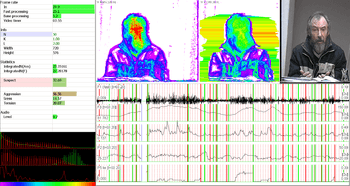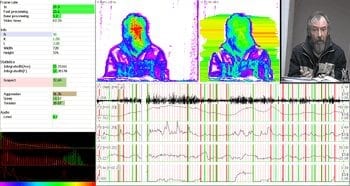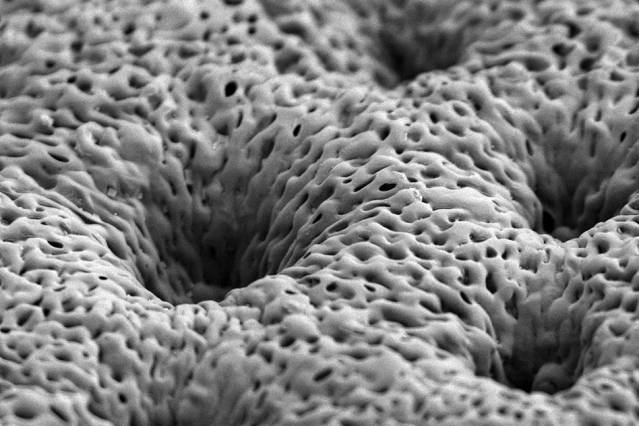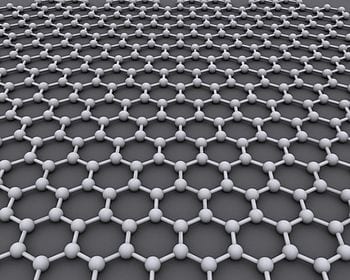
Non-experts have high rates of success of lie detection when viewing experts work
Determining deception is a tool of the trade for law enforcement. The Good Cop/Bad Cop routine is etched in our minds as an effective method of finding out the truth. But prior research has shown that lie detecting is a 50/50 shot for experts and non-experts alike. So what exactly can we do to find out the truth? A recent study published in Human Communication Research by researchers at Korea University, Michigan State University, and Texas State University – San Marcos found that using active questioning of individuals yielded near-perfect results, 97.8%, in detecting deception.
Timothy Levine, Hee Sun Park (University of Korea), David Daniel Clare, Steve McCornack, Kelly Morrison (Michigan State University), and J.Pete Blair (Texas State – San Marcos) published their findings in the journal Human Communication Research. The researchers conducted three studies based on sets of participants who were asked to play a trivia game. Unbeknownst to the participants, a confederate was placed with them offering an incentive and opportunity to cheat at the game, since cash prizes were involved. In the first experiment 12% of the subjects cheated; in the second experiment 44.9% cheated.
An expert using the Reid Technique interrogated participants in the first study, this expert was 100% accurate (33 of 33) in determining who had cheated and who had not. That kind of accuracy has 100 million to one odds. The second group of participants were then interviewed by five US federal agents with substantial polygraph and interrogation expertise. Using a more flexible and free approach (interviews lasted from three minutes to 17 minutes), these experts were able to accurately detect whether or not a participant cheated in 87 of 89 interviews (97.8%). In the third study, non-experts were shown taped interrogations of the experts from the previous two experiments. These non-experts were able to determine deception at a greater-than-chance rate – 79.1% (experiment 1), and 93.6% (experiment 2).
Previous studies with “experts” usually used passive deception detection where they watched videotapes. In the few studies where experts were allowed to question potential liars, either they had to follow questions scripted by researchers (this study had no scripts) or confession seeking was precluded. Previous studies found that accuracy was near chance – just above 50%.
“This research suggests that effective questioning is critical to deception detection,” Levine said. “Asking bad questions can actually make people worse than chance at lie detection, and you can make honest people appear guilty. But, fairly minor changes in the questions can really improve accuracy, even in brief interviews. This has huge implications for intelligence and law enforcement.”
The Latest on: Lie detection
[google_news title=”” keyword=”Lie detection” num_posts=”10″ blurb_length=”0″ show_thumb=”left”]
via Google News
The Latest on: Lie detection
- New England stone walls lie at the intersection of history, archaeology, ecology and geoscience, and deserve a science of their ownon April 28, 2024 at 7:04 am
New England has thousands of miles of stone walls. A geoscientist explains why analyzing them scientifically is a solid step toward preserving them ...
- 32 times lasers revealed hidden forts and settlements from centuries agoon April 27, 2024 at 3:01 am
Lasers have helped uncover ancient human-made structures the world over. Lasers are being used extensively in archaeology for recording and discovering sites as well as analyzing artifacts in great ...
- Odd Lots Newsletter: Anything But Bondson April 26, 2024 at 11:18 am
Hello and welcome to the weekly Odd Lots newsletter, where Joe Weisenthal and Tracy Alloway bring you their thoughts on the most interesting developments in markets, finance and the economy. This week ...
- Phil Houston on Techniques to Identify Lies in Businesson April 26, 2024 at 7:07 am
Not many people think about interrogating senior executives and employees, and asking the right questions to figure out whether they're telling the truth about the business model. In this episode, we ...
- Magnus Carlsen takes lie detector test; reveals he played game while drunk, peed his pants onceon April 25, 2024 at 7:36 am
Carlsen is asked if he would teach his kids chess and encourage them to have a career in the sport. Carlsen admits: "I would teach my kids chess, but I would not encourage them to play professionally.
- Murder trial testimony focuses on defendant's failed polygraph and victim's 'missing' wigon April 23, 2024 at 2:30 am
Polygraph expert says Jay White failed a lie detector test he volunteered to take. Investigator admits wig not preserved as evidence.
- Jeremy Kyle guest had lie-detector test ‘pushed in his face’ days before suspected suicideon April 22, 2024 at 7:00 am
A guest on The Jeremy Kyle Show who died in a suspected suicide had the results of a lie-detector test pushed in his face and was branded a “serial liar”, a coroner was told today. Stephen Dymond was ...
- Jeremy Kyle guest had lie detector results ‘pushed right in his face’ before suspected suicideon April 22, 2024 at 5:11 am
At a pre-inquest review today, the Dymond family’s barrister said he had been ‘followed off stage by Mr Kyle and two cameramen, one right next to him when he sat off stage’ and had the results of the ...
- Mysterious case of man convicted of killing two teenage girls despite passing lie detector teston April 17, 2024 at 5:04 am
The case of a man convicted of killing two teenage girls despite passing a lie detector test is one of the US' most mysterious crimes. Dawn Donaldson and Crissy Campbell grew up in the small mining ...
- Romania’s far-Right party to use lie detector tests to prove candidates are not ‘infiltrators’on April 16, 2024 at 8:10 am
Romania’s far-Right AUR party has announced it will make candidates take lie detector tests to prove their loyalty ahead of European Parliament elections.
via Bing News











